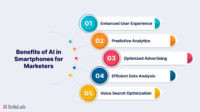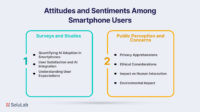Artificial Intelligence (AI) in mobile is transforming how we interact with our devices, making them smarter and more intuitive. At pioneer-technology.com, we’re dedicated to providing clear, insightful analysis on these cutting-edge technologies, offering solutions that demystify AI’s impact on our daily lives. Explore how AI is revolutionizing mobile through personalized experiences, enhanced security, and streamlined automation. Dive deeper with us and discover the latest in machine learning, natural language processing, and advanced image recognition, unlocking the full potential of intelligent mobile solutions.
1. How Does AI Elevate Efficiency and User Delight in Today’s Mobile Devices?
AI is revolutionizing mobile devices, significantly boosting user experience and efficiency. By learning from user behaviors, AI tailors devices to individual needs, making interactions more intuitive and satisfying. Let’s explore how AI enhances mobile devices:
A. Superior User Experience
1. Personalization
AI provides a highly personalized user experience on smartphones. Analyzing user behavior and preferences, AI tailors functionalities, offering a customized and user-friendly interface. This personalization extends to app recommendations and content, greatly enhancing the mobile experience.
According to a study by McKinsey, companies using personalization see a 5-15% increase in revenue, highlighting the impact of AI-driven customization.
2. Predictive Text and Recommendations
AI-driven predictive text has transformed mobile communication. Natural language processing algorithms learn from typing habits, predicting words and phrases, which accelerates typing speed and minimizes errors, greatly improving communication efficiency.
B. Improved Efficiency
1. Virtual Assistants
AI-powered virtual assistants are now crucial for modern smartphones, offering hands-free and voice-activated functionalities. Assistants like Siri and Google Assistant use AI to understand commands, perform tasks, and provide information, streamlining daily activities and improving accessibility.
2. Task Automation
AI in smartphones automates routine tasks, saving users valuable time. AI algorithms learn from user behavior, automating tasks such as organizing emails, setting reminders, and adjusting settings based on preferences, which boosts efficiency and allows users to focus on more important tasks.
2. How Has AI Integration Revolutionized Mobile Photography?
AI has revolutionized mobile photography, significantly enhancing how we capture moments. AI applications in mobile photography have brought groundbreaking advancements, enhancing user experience and redefining smartphone camera capabilities.
A. Image Recognition
1. Face Detection
One key AI-driven feature in mobile photography is face detection. Sophisticated algorithms allow AI smartphones to accurately identify and focus on human faces, ensuring sharp portraits and facilitating features like automatic face tagging and beautification.
2. Object Recognition
AI extends beyond face detection to object recognition, enhancing mobile photography. Smartphones can identify various objects, allowing for intelligent scene optimization, which enhances overall image quality by adjusting settings based on the recognized objects.
B. AI-Driven Camera Features
1. Portrait Mode
AI has undeniably impacted portrait photography through Portrait Mode. AI smartphones simulate shallow depth of field using advanced depth-sensing algorithms, creating bokeh effects that highlight the subject and blur the background.
2. Night Mode
Capturing moments in low-light has always been challenging, but AI-driven Night Mode provides a solution. By employing intricate algorithms, AI smartphones capture bright, detailed images in low-light, optimizing exposure, reducing noise, and enhancing image quality.
According to a report by Counterpoint Research, AI-enhanced camera features are a key factor influencing smartphone purchase decisions.
3. What Key Advantages and Privacy Concerns Arise With AI Integration in Smartphones?
AI integration in smartphones offers many benefits but also presents privacy challenges. Facial recognition and biometric authentication are significant advancements, but balancing innovation with user privacy is essential.
Facial Recognition and Biometric Authentication
AI-driven facial recognition offers secure smartphone access. Analyzing unique facial features, this technology enhances user authentication. However, it’s crucial to address privacy concerns related to facial data processing and storage.
Privacy Challenges and Responsible AI
While AI enhances security, privacy challenges are significant. Balancing AI benefits with data protection is essential. Responsible AI practices and collaboration between developers and policymakers can establish frameworks for ethical data use.
AI-Based Mobile Security Measures
AI enhances mobile security through proactive threat detection. Analyzing user behavior and network activities, AI identifies potential security threats, ensuring real-time monitoring and dynamic defenses.
Dynamic Defenses Against Fraud
AI empowers mobile devices to recognize and mitigate fraudulent activities. Machine learning algorithms adapt to new fraud patterns, providing users with dynamic defenses against emerging threats.
AI’s role in enhancing mobile security requires balancing innovation and responsibility. Addressing privacy concerns and establishing ethical standards are paramount to ensuring a secure digital environment.
4. What Key Obstacles and Ethical Factors Come With Integrating AI Into Mobile Devices?
Integrating AI into mobile phones presents both benefits and significant challenges, particularly concerning ethical considerations. Addressing these issues is crucial for responsible AI development and deployment.
A. Bias in AI Algorithms
One major issue is the potential for bias in AI algorithms. These algorithms can inadvertently reflect societal biases, leading to unfair outcomes, especially in facial recognition. Addressing this requires constant vigilance, diverse data sets, and ongoing refinements to ensure fairness.
B. Privacy Issues
AI integration raises significant privacy concerns. The collection and analysis of personal data can lead to breaches and misuse. Balancing personalized experiences with user privacy is crucial, requiring robust encryption, transparent data policies, and user consent mechanisms.
C. Job Displacement Concerns
AI adoption can lead to job displacement as automation replaces human tasks. Policymakers and industry leaders must proactively address this through educational programs and workforce adaptation.
By addressing bias, ensuring privacy, and mitigating job displacement, we can harness AI’s potential while upholding ethical standards.
5. What Implications Does AI on Mobile Tech Have for Marketers?
AI in mobile technology has reshaped marketing, opening new possibilities and enhancing user experiences. From AI-powered assistants to advanced image recognition, marketers have powerful tools to engage with their audience.
1. AI in Smartphones: A Game Changer for Marketers
AI applications have become integral to marketing strategies. From predictive analytics to machine learning, AI enables marketers to analyze data and gain insights into consumer behavior, facilitating targeted campaigns that resonate with individual preferences.
2. Benefits of AI in Smartphones for Marketers
 AI Benefits for Marketers
AI Benefits for Marketers
AI provides several key benefits for marketers:
- Enhanced User Experience: AI-driven chatbots provide personalized interactions, enhancing user experience.
- Predictive Analytics: AI algorithms predict consumer trends, enabling marketers to tailor strategies accordingly.
- Optimized Advertising: AI enables precise ad targeting, ensuring relevant and timely advertisements.
- Efficient Data Analysis: AI automates the analysis of datasets, allowing marketers to extract insights quickly.
- Voice Search Optimization: Marketers can optimize content for voice search, catering to users relying on voice commands.
6. How Does AI Merge with AR/VR To Transform User Experiences on Mobile Devices?
AI is set to revolutionize smartphone capabilities, ushering in a new era of user experience. As we explore the future of AI in mobile phones, three prominent trends are set to reshape the landscape.
A. Integration with 5G Technology
The synergy between AI and 5G technology enhances mobile phone performance. AI algorithms integrated with 5G networks enable faster data processing, lower latency, and improved connectivity, empowering AI applications for real-time processing.
B. Augmented Reality (AR) and Virtual Reality (VR)
The convergence of AI and AR/VR is transformative, bringing immersive experiences to mobile devices. AI-driven AR and VR create interactive simulations, blurring the lines between the digital and physical worlds.
C. Continued Advances in Natural Language Processing
The evolution of Natural Language Processing (NLP) remains a focal point in AI development. AI-driven voice assistants and language understanding capabilities are becoming increasingly sophisticated, enabling smartphones to comprehend and respond to human language nuances.
Combining AI with 5G, AR/VR, and NLP positions smartphones at the forefront of technological innovation.
7. What User Attitudes and Opinions Prevail Regarding AI in Smartphones?
 User Sentiments on AI
User Sentiments on AI
Exploring user perspectives on AI in mobile phones reveals a complex interplay of technological advancements and human experiences. Surveys and studies provide insights into AI adoption, public sentiment, and concerns.
A. Surveys and Studies
- Quantifying AI Adoption: Surveys show a growing acceptance of AI technology, with users highlighting the convenience of AI features.
- User Satisfaction: Studies show positive feedback on enhanced user experiences and improved efficiency from AI integration.
- User Expectations: Surveys indicate expectations for intuitive voice commands, context-aware personalization, and AI-driven health monitoring.
B. Public Perception and Concerns
- Privacy Apprehensions: Public concerns about data privacy and security are prominent, with users expressing anxiety about potential misuse of personal information.
- Ethical Considerations: Ethical implications, like algorithmic bias and accountability, are under scrutiny, emphasizing the need for transparent AI decision-making.
- Impact on Human Interaction: Concerns exist about AI altering human interaction patterns, with discussions on balancing automation and preserving genuine connections.
- Environmental Impact: Public concerns extend to the environmental impact of AI, including discussions on energy consumption and eco-friendly solutions.
Balancing AI’s benefits with user concerns around privacy and ethical considerations is a challenge. Ongoing dialogue between users, developers, and policymakers will shape the evolution of AI in mobile phones.
8. The Synergy Between AI and Mobile Technology: Future Trends
The intersection of artificial intelligence (AI) and mobile technology is paving the way for innovative and transformative trends. These are poised to redefine how we interact with our smartphones and mobile devices. Let’s dive into some of these cutting-edge developments:
A. On-Device AI Processing
On-device AI processing refers to the capability of mobile devices to perform AI tasks locally without relying on cloud-based servers. This trend brings about significant advantages in terms of:
-
Reduced Latency: By processing data directly on the device, response times are significantly reduced, leading to faster and more responsive user experiences.
-
Enhanced Privacy: User data remains on the device, minimizing the risk of data breaches and privacy concerns associated with transmitting sensitive information to external servers.
-
Offline Functionality: On-device AI enables mobile apps to continue functioning even without an active internet connection, ensuring uninterrupted access to AI-powered features.
B. AI-Powered Mobile Health Applications
AI-powered mobile health applications are revolutionizing healthcare and wellness, offering a range of features such as:
-
Personalized Health Recommendations: AI algorithms analyze user data to provide customized health recommendations, tailored to individual needs and preferences.
-
Remote Patient Monitoring: AI-enabled sensors and wearables continuously monitor patients’ vital signs and health metrics, allowing healthcare providers to remotely track their condition and intervene when necessary.
-
Early Disease Detection: AI algorithms can detect subtle patterns and anomalies in health data, enabling early detection of diseases and facilitating timely interventions.
C. Enhanced Mobile Gaming Experiences with AI
AI is enhancing mobile gaming experiences by:
-
Intelligent Non-Player Characters (NPCs): AI algorithms enable the creation of more realistic and adaptive NPCs, enhancing the depth and complexity of gameplay.
-
Adaptive Game Difficulty: AI algorithms dynamically adjust the game’s difficulty level based on the player’s skill and performance, ensuring an engaging and challenging gaming experience.
-
Procedural Content Generation: AI algorithms can procedurally generate unique game content, such as levels, quests, and storylines, extending the lifespan and replayability of mobile games.
9. How Can Consumers Navigate Security and Personalization with AI?
Navigating the intricate landscape of security and personalization in AI requires a nuanced approach that empowers consumers with the knowledge and tools to manage their digital experiences effectively.
A. Educating Users on Data Privacy Practices
Empowering users with a comprehensive understanding of data privacy practices is paramount.
- Promoting Awareness: Create easy-to-understand content that explains how AI systems collect, process, and utilize user data.
- Transparency in Data Usage: Clearly outline the types of data collected, the purposes for which it is used, and with whom it is shared, fostering transparency and trust.
- Highlighting User Rights: Educate users about their rights regarding data privacy, including the right to access, rectify, and erase their personal information.
B. Empowering Users with Granular Control over Permissions
Granting users granular control over permissions enables them to customize their AI experiences according to their preferences and comfort levels.
- Permission Management Tools: Provide intuitive tools that allow users to easily manage app permissions, granting or revoking access to specific features and data categories.
- Contextual Permission Prompts: Implement contextual permission prompts that provide clear explanations of why an app requires access to certain data, empowering users to make informed decisions.
- Privacy Dashboards: Offer centralized privacy dashboards that provide users with a comprehensive overview of their data usage and privacy settings across all AI-powered applications.
C. Promoting the Development of Privacy-Enhancing Technologies
Encouraging the development and adoption of privacy-enhancing technologies is essential for safeguarding user data in AI ecosystems.
- Federated Learning: Support the development of federated learning techniques that allow AI models to be trained on decentralized data sources without directly accessing or transferring sensitive information.
- Differential Privacy: Implement differential privacy mechanisms to add noise to data sets, protecting individual privacy while still enabling AI algorithms to extract valuable insights.
- Homomorphic Encryption: Invest in homomorphic encryption technologies that enable AI algorithms to perform computations on encrypted data without the need for decryption, ensuring data confidentiality at all times.
By educating users, empowering them with control, and promoting privacy-enhancing technologies, we can ensure that AI remains a force for good, enhancing our lives while respecting our fundamental rights to privacy and security.
10. What Role Will AI Play in the Evolution of Mobile Devices?
As we look to the future, AI is poised to become even more deeply ingrained in the fabric of our mobile devices, driving innovation and shaping the way we interact with technology. Let’s explore the pivotal roles that AI will play in the evolution of mobile devices:
A. Personalized and Context-Aware Experiences
AI will revolutionize mobile devices by:
-
Adaptive Interfaces: AI algorithms will analyze user behavior and preferences to dynamically adapt the device’s interface, ensuring that essential functions and content are always readily accessible.
-
Predictive Assistance: AI-powered virtual assistants will anticipate user needs and provide proactive assistance, such as suggesting relevant apps, setting reminders, and offering timely information.
-
Contextual Recommendations: AI algorithms will leverage contextual data, such as location, time of day, and user activity, to provide personalized recommendations for content, products, and services.
B. Enhanced Security and Privacy
AI will also play a pivotal role in enhancing the security and privacy of mobile devices through:
-
Biometric Authentication: AI-powered biometric authentication methods, such as facial recognition and fingerprint scanning, will provide seamless and secure access to devices and sensitive data.
-
Threat Detection and Prevention: AI algorithms will continuously monitor device activity and network traffic to detect and prevent security threats, such as malware infections and phishing attacks.
-
Privacy-Preserving AI: AI technologies, such as federated learning and differential privacy, will enable mobile devices to leverage the power of AI while safeguarding user privacy and data confidentiality.
C. Seamless Integration with IoT Ecosystems
AI will facilitate seamless integration between mobile devices and the broader Internet of Things (IoT) ecosystem, enabling users to:
-
Control Smart Home Devices: AI-powered mobile apps will allow users to remotely control and manage their smart home devices, such as lights, thermostats, and appliances, from anywhere in the world.
-
Monitor Health and Fitness Metrics: AI-enabled wearables and health sensors will continuously monitor users’ health and fitness metrics, providing valuable insights and personalized recommendations.
-
Interact with Smart City Infrastructure: AI algorithms will enable mobile devices to interact with smart city infrastructure, such as traffic management systems and public transportation networks, enhancing urban living experiences.
Conclusion
In summary, integrating AI into mobile phones offers numerous benefits, transforming user experiences and enhancing device capabilities. From personalized suggestions to efficient virtual assistants, AI puts convenience and productivity at our fingertips. Navigating the ethical and privacy considerations associated with AI deployment in mobile devices is essential, ensuring transparency and user control over data use. With careful study and responsible development, AI in mobile phones can drive innovation and improve our daily lives.
At pioneer-technology.com, we’re committed to providing you with the latest insights and analysis on AI and its impact on mobile technology. Explore our site to discover how AI is shaping the future of mobile devices and enhancing our daily lives.
FAQs
1. What is AI in smartphones?
AI in smartphones involves integrating machine learning algorithms to enhance device functionality.
2. How does AI benefit mobile phones?
AI improves user experience, performance, and offers personalized recommendations.
3. What are key AI features in smartphones?
Key features include facial and image recognition, natural language processing, and predictive text.
4. How does AI improve camera performance?
AI optimizes camera settings, enhances image quality, and recognizes objects in real-time.
5. Are AI voice assistants secure?
Yes, AI assistants use advanced security protocols to protect user data.
6. Can AI improve battery life?
Yes, AI algorithms optimize power consumption for extended battery life.
7. How does AI personalize user experience?
AI adapts to user behavior, providing tailored content and app recommendations.
8. What privacy concerns are associated with AI in mobile phones?
Concerns include data collection, storage, and potential misuse of personal information.
9. How is AI used in mobile security?
AI detects threats, prevents fraud, and provides biometric authentication.
10. What is the future of AI in mobile technology?
The future includes enhanced AR/VR experiences, on-device processing, and seamless integration with IoT devices.
For more in-depth information and the latest updates on AI in mobile technology, visit pioneer-technology.com today. Discover how AI is transforming our mobile experiences and what the future holds. Stay informed and explore the endless possibilities with us. Contact us at 450 Serra Mall, Stanford, CA 94305, United States. Phone: +1 (650) 723-2300.

